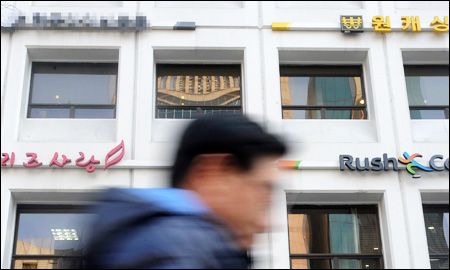
Private lenders use Park’s debt plan as marketing tool
Saving debt-crushed families is good for the economy, says incoming President Park Geun-hye.
But critics are sounding the alarm on her plans for intervention, arguing that using taxpayer’s money to rescue the more needy borrowers will cause the nation to fall prey to a further moral hazard: Letting someone who has engaged in financially risky behavior off the hook encourages the same behavior in the future, they say.
It didn’t take long for the critics to be vindicated. Financial authorities are now alerted that payday lenders are using Park’s plan as a marketing tool. An increasing number of them are seen as sweet-talking borrowers who take out additional loans claiming that the new government will come to their rescue.
There have been increasing concerns that people on low-incomes, who have reduced access to bank loans, are relying more on secondary lenders and payday loan providers despite higher borrowing costs, which plunges them deeper into a vicious cycle of debt.
“Nobody wants to see the market for payday lenders blow up again when personal finance is precarious as it is,’’ said an official from the Financial Services Commission (FSC), whose Chairman Kim Seok-dong has been the most vocal critic of Park.
“The risk of the moral hazard has been increased for both the demand and supply side of things. Payday lenders seem to be encouraging low-credit borrowers to borrow more because their new government will convert their loans into low-interest loans managed by banks. There is a need for quick measures to fix this problem, such as employing stronger lending restrictions.’’
Park’s plan is to create an 18 trillion won (about $16.5 billion) “national happiness’’ fund to reduce the debt servicing burden of more than 3.2 million borrowers in most desperate need of help. They will have their liabilities shaved by 50 to 70 percent and their high-interest loans converted to bank loans with lower borrowing costs and longer maturities.
Payday lenders charge as much as around 30 percent in interest rates on their loans. It’s much easier for them to find borrowers when they can dangle the possibility of the interest rates being reduced to below 10 percent under looser repayment conditions from banks.
Park’s drastic measure doubles as a confession that the levels of personal debt pose a serious threat to the country’s financial stability. Currently at around one quadrillion won according to broad estimates, the household debt mountain essentially matches an entire year’s gross domestic product (GDP).
Much of Korea’s personal debt is tied to a speculative property boom that occurred during the early-to-mid 2000s when people borrowed excessively to splurge on homes believing that prices would rise forever, only to have their hopes obliterated by the global downturn.
Policymakers are concerned that household debt will continue to grow at an alarming rate because nobody seems to be buying houses anymore. Widening inequality and a disastrous vortex of stagnant income, unemployment and spiraling debt have resulted in an increasing number of low-incomers borrowing to finance their daily living costs.
There is much debate over the government’s role in defusing the threat posed by the high levels of personal debt. Among those backing an active involvement from the state is Gongpil Choi of the state-run Korea Institute of Finance (KIF).
Choi believes that Korea is facing the threat of a “balance sheet recession,’’ where the plunge in asset values becomes dramatic enough to shift priorities from profit maximization to debt minimization. This kills off the effectiveness of macro-economic actions such as jolting the money supply and makes it inevitable for a massive amount of public funds to purge personal debt.
“We are long passed the point where normal measures will work as prescribed. We can’t allow the deflation in asset value to accelerate and squeeze the broader real economy,’’ Choi said.
Others are concerned that Park’s plan might pervert the relationship between lender and borrower, which is where the fixing should start. They make the scornful point that national happiness fund will contribute more to the happiness of banks than borrowers and question why more traditional options, such as easing up on personal bankruptcy requirements, can’t be considered.
The household debt fund will be raised by bonds issued from the Korea Asset Management Corporation’s (KAMCO) credit recovery fund and surplus of its delinquent loans fund. This has Park arguing that taxpayers aren’t being additionally burdened, apparently a misrepresentation that relies on the public’s lax understanding of bonds.
It’s also questionable whether 18 trillion won could even manage to be a band aid when the amount of unpaid home-backed loans is estimated to be at around 600 trillion won combining lending from commercial banks and secondary lenders. <The Korea Times/Kim Tong-hyung>




